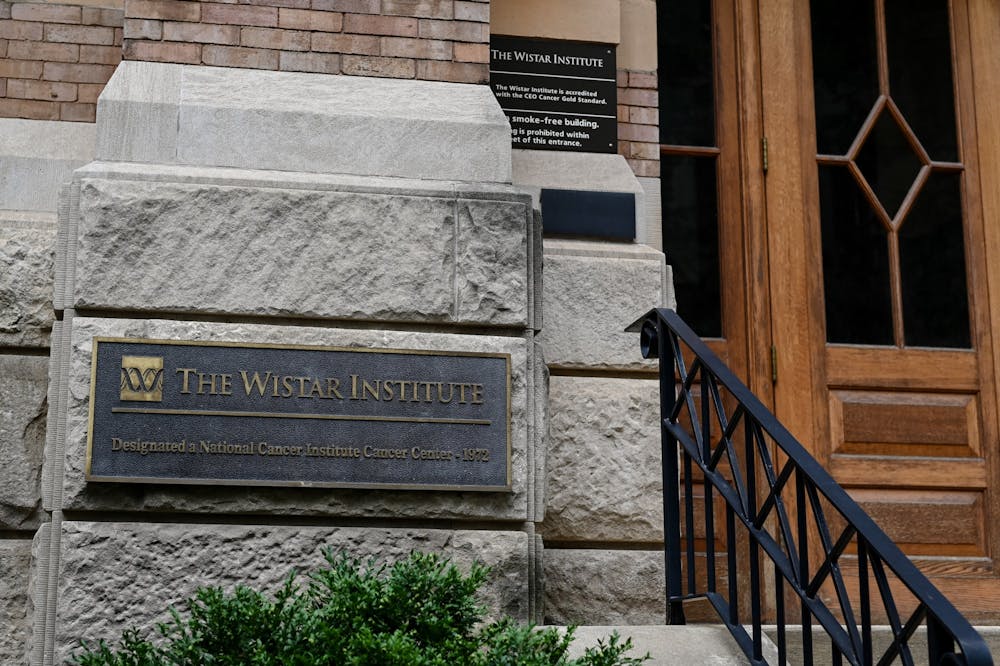
The COVID-19 vaccine developed by The Wistar Institute and Penn Medicine is entering a phase two trial in September.
Credit: Kylie CooperFour months after The Wistar Institute and Penn Medicine began testing Inovio Pharmaceutical's COVID-19 vaccine, all trial participants have demonstrated an overall immune response and experienced little to no side effects. Phases two and three of the study are expected to commence in September with more participants.
The phase one trial, taking place at Penn Medicine and Center for Pharmaceutical Research in Kansas City, has 40 participants between 18 and 50 years old. The trial began on April 3 to test the safety and initial immunogenicity of the vaccine. Immunogenicity is the vaccine's ability to induce an immune response in the body.
The vaccine was the second of its kind to enter a phase one clinical study in the United States. Four U.S. vaccines have already reached at least phase two of clinical trials, according to The New York Times.
Phase two will test the vaccine's safety and immunogenicity in a larger population, while phase three will simultaneously evaluate its efficacy and readiness for distribution. Penn Med professor and principal clinical investigator of the study Pablo Tebas will continue to oversee the next phases with greater numbers of participants at more universities nationwide, the Wistar Institute's Vaccine and Immunotherapy Center Director David Weiner said.
Weiner said the universities and number of participants will be determined once Inovio Pharmaceuticals receives approval from the Food and Drug Administration to enter the next phases, which he anticipates will be by September.
The Wistar Institute announced its partnership with Inovio Pharmaceuticals on Jan. 23 to develop a COVID-19 vaccine. The collaboration is backed by $9 million from the Coalition for Epidemic Preparedness Innovations, a global organization based in Norway.
All 40 trial participants in the phase one trial demonstrated an overall immune response, with 95% of trial participants developing antibodies, according to an update from Inovio Pharmaceuticals on Aug. 10. Antibodies are proteins that can help prevent the body from getting infected by the same virus again.
The vaccine was generally safe and well-tolerated in all participants, with only six vaccine-related grade one adverse events — mild, asymptomatic or mild symptoms, clinical or diagnostic observations — which do not require intervention, Weiner said. He added that the vaccine produced less adverse events than most of the other COVID-19 vaccines that have entered clinical trials.
A COVID-19 vaccine developed by Oxford University and the drug giant AstraZeneca elicited side effects such as fever, headaches, muscle aches, and injection site reactions in about 60% of patients, according to American health news website Stat. Some manufacturers such as Moderna, based in Massachusetts, and CanSino Biologics, based in China, have stopped testing the highest doses of COVID-19 vaccines due to the number of severe adverse events recorded among participants, Stat reported.
2009 College graduate and study participant Anthony Campisi said he has not experienced any negative side effects as a result of the vaccine. He added participating in the trial has been a positive and rewarding experience as he learns more about the trial, pointing to the Penn Medicine staff's willingness to answer his questions about the vaccine.
“I understand that this is all moving really quickly and I’m not a doctor or a scientist but what I can say is that the team that I’ve been seeing as part of this trial has been very focused on producing good science and making sure that they get it right,” Campisi said.
Since the phase one trial began in April, Inovio added another site at the University of Kentucky with 80 participants between 51 and 65 to study the response in more senior individuals, Weiner said.
The phase one clinical manuscript with the data collected thus far is undergoing peer review for publication in a "top medical journal," according to Inovio Pharmaceuticals.
He believes COVID-19 vaccines will start to become available sometime in 2021 with priority given to high-risk populations and individuals who can help lower the risk of contracting the virus in the greater population. Doses for the general population should be available by 2022, he said.
The vaccine, based on synthetic DNA technology, is an expansion of the team’s vaccine design for Middle East Respiratory Syndrome, which resulted in close to 2,500 cases and over 850 deaths in 2012. The Wistar Institute has previously worked with Inovio to develop vaccines for the Ebola virus, Zika virus, and MERS.
“It’s an honor to be part of this," Weiner said. "Trying to go through this at the speed which everyone wants and also watching the toll that this infection is taking on our local community, on our Penn/Wistar community, on our state is a very unusual thing.”
The Daily Pennsylvanian is an independent, student-run newspaper. Please consider making a donation to support the coverage that shapes the University. Your generosity ensures a future of strong journalism at Penn.
Donate






